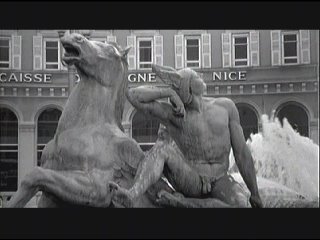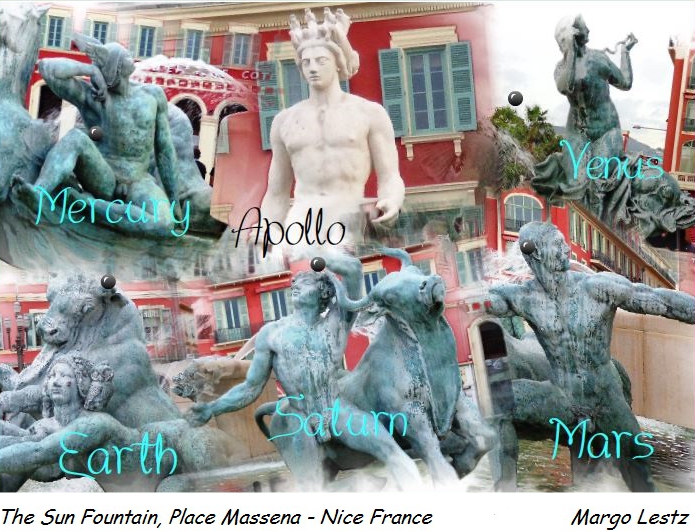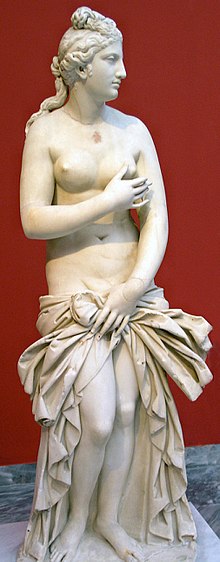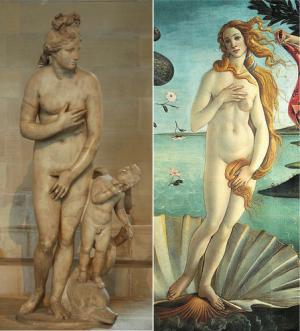Life Matters | |
- E-mail - orgNote -  Report post to moderator Report post to moderator |
This is interesting too, thank you for pointing that out. Life Matters | |
- E-mail - orgNote -  Report post to moderator Report post to moderator |
In Prince's video of 'Still Would Stand All Time', there is a painting behind Prince of what could either be an angel or a harpy. Because of the paleness and the expression on the woman's face, I would lean towards the harpy likeness. ----------------
In Greek mythology and Roman mythology, a harpy (plural harpies, Greek: ἅρπυια,[1][2] harpyia, pronounced [hárpyi̯a]; Latin: harpȳia) was a half-human and half-bird personification of storm winds, in Homeric poems.[3]
(Wikipedia) Life Matters | |
- E-mail - orgNote -  Report post to moderator Report post to moderator |
The 'Under The Cherry Moon' film trailer shows a glimpse of a statue of Mercury (major Roman god), located at the Fontaine Du Soleil at Massena Place in Nice. The statue comes as part of a bigger display of statues representing Greek and Roman gods and goddesses. [Edited 9/28/17 4:53am] Life Matters | |
- E-mail - orgNote -  Report post to moderator Report post to moderator |
"Anti-intellectualism has been a constant thread winding its way through our political and cultural life, nurtured by the false notion that democracy means that "my ignorance is just as good as your knowledge"" ~ Isaac Asimov | |
- E-mail - orgNote -  Report post to moderator Report post to moderator |
It seems highly unlikely he was a scholar of Ancient Greek and Roman works but he certainly played with the popular interpretations of them. I assume he read The Odyssey when he decided to do Glam Slam Ulysses but I doubt he was subscribing to Ancient History scholarly journals or doing heavy interpretative readings. Wasn't he raving about that Tut miniseries a few months before he passed, that was more his style. I remember he did an email Q&A with the Irish times or independent and they asked him if he had ever read any of the Irish classic like Joyce or Yeats or whoever and he responded with "There's still time!" or something along those lines. We know he prized learning and knowledge but he also played music all day and night and read the Bible a LOT, he only had so much time in his life! | |
- E-mail - orgNote -  Report post to moderator Report post to moderator |
the Venus de Milo goes back to Parade
| |
- E-mail - orgNote -  Report post to moderator Report post to moderator |
| |
- E-mail - orgNote -  Report post to moderator Report post to moderator |
| |
- E-mail - orgNote -  Report post to moderator Report post to moderator |
Life Matters | |
- E-mail - orgNote -  Report post to moderator Report post to moderator |
"I guess I must be dumb
🐎 [Edited 9/29/17 6:19am] Life Matters | |
- E-mail - orgNote -  Report post to moderator Report post to moderator |
jaawwnn said: It seems highly unlikely he was a scholar of Ancient Greek and Roman works but he certainly played with the popular interpretations of them. I assume he read The Odyssey when he decided to do Glam Slam Ulysses but I doubt he was subscribing to Ancient History scholarly journals or doing heavy interpretative readings. Wasn't he raving about that Tut miniseries a few months before he passed, that was more his style. I remember he did an email Q&A with the Irish times or independent and they asked him if he had ever read any of the Irish classic like Joyce or Yeats or whoever and he responded with "There's still time!" or something along those lines. We know he prized learning and knowledge but he also played music all day and night and read the Bible a LOT, he only had so much time in his life! --Van Jones said he knew a lot of about ancient African civilations | |
- E-mail - orgNote -  Report post to moderator Report post to moderator |
CherryMoon57 said:
--It was inspired by the movie. | |
- E-mail - orgNote -  Report post to moderator Report post to moderator |
Yes, Egyptology was his big focus of study | |
- E-mail - orgNote -  Report post to moderator Report post to moderator |
He who wins the war makes the rules. This is true of language, sense of beauty, and ideology of law as well as general sentiments regarding one's culture. As such, since Egypt fell as the first global empire, every other world power has been from the West, beginning with Greece, then Rome, next Great Britain, and, finally America. And, since Great Britain and America merely, for the most part, reworked Greek and Roman notions about language, beauty, and law, it only stands to reason that the artists living in those cultures will reflect, in one way or another, Greek and Roman influence. To grossly paraphrase T. S. Eliot's "Tradition and the Individual Talent," the most effective/noted artists are those who find ways to understand and master history in way that their work builds on the past and does something interesting/new/innovated with it. And, that was certainly one of Prince's hallmarks of how he related to and used history to recontextualize a new way of being. So, as an American, even an African American who began his career leaning towards and trying to find his place within the Western aesthetic, it is only natural that he would be influenced by Greek and Roman culture. Yet, as his understanding of the African and African-American place in and contributions to world civilizations expanded, his aesthetic began to expand and incorporate those as well, especially since his essential/early base is the foundation of the African-American musical aesthetic. Yet, even the African-American musical aesthetic is one of amalgamating the tastes/styles of African people dislocated in a Western world. Thus, he continued to inject funk into Western aesthetics in the same way to so many African-American artists before him had, be they blues, jazz, rock, soul, or funk artists.
| |
- E-mail - orgNote -  Report post to moderator Report post to moderator |
OldFriends4Sale said:
Yes, Egyptology was his big focus of study In particular, an interest in the heretic pharaoh, Akhenaten circa 2000 I believe. As well as featuring a relief of him on the single for Peace, he's also referenced in The Rainbow Children. Edited as found this after posting. Blimey. https://www.amazon.com/Pr...B01G34FSY4 [Edited 9/29/17 11:45am] If the milk turns out to be sour, I aint the kinda pussy to drink it! | |
- E-mail - orgNote -  Report post to moderator Report post to moderator |
Parts of 'violet the organ grinder' too with the statues etc. | |
- E-mail - orgNote -  Report post to moderator Report post to moderator |
OldFriends4Sale said:
Yes, Egyptology was his big focus of study Hold on. Egyptology is NOT the same as ancient African civilizations. Which civilizations? Mali? Benin? Zimbabwe? Mr. Van Jones would need to explain himself here | |
- E-mail - orgNote -  Report post to moderator Report post to moderator |
I've always connected Egypt with Ancient African civilizations because technically it is. . Egypt is geographically ethnically culturally connected with Ethiopia, the Nubian kingdoms, Chad etc . and excavators have proven that the people who buildt Egypt (who are still there, not the Arabs) came 'UP' to the region from lower parts of Africa as the Sahara dessert expanded. . The narrative of Egypt has been 'whitewashed' and people have tried to disconnect it from Africa, but it is Ancient Africa.
* now of course this has opened up a door of further discussion that will take the thread off topic. So I would welcome a discussion in the P&R forum. I started one a few years ago on Egypt. And this thread is asking for Ancient Roman & Greek influences. | |
- E-mail - orgNote -  Report post to moderator Report post to moderator |
* Thank you!!! I can't believe people still don't know this. Also, before Egypt was one unified country, it was Upper and Lower Egypt; yet, Upper Egypt was in the South, and Lower Egypt was in the North because Upper Egypt meant first and Lower Egpyt meat second as the Nubians from the southern base of the Nile walked into the southern end of Egypt, which was the first part that they developed. Finally, the original name of Egypt is Kemet, which means, "the Land of the Blacks," and it was called this by prominent Greeks, such as Herodotus--the father of Greek History, and Aristotle. In fact, in his discussion of Kemet, Herodotus stated that "there are two great Ethiopian nations, one being in Kemet. He also said, when describing the Kemetians that they "have full lips, woolly hair, and burnt skin." That ain't Brad Pitt he's describing. Yet, I like Aristotle's description of the Kemetians better when he stated: "the Kemetians are very black." He didn't say they were light-skinned, off-white, tan, or high yellow; he said "very black," again, that ain't Brad Pitt. | |
- E-mail - orgNote -  Report post to moderator Report post to moderator |
Prince's interest in ancient Egypt is very evident, in particular on The Rainbow Children, and this is why I wanted to look at other influences also present in his work throughout his career. I think influences from the ancient mediterranean culture were always more or less there whereas the former seemed to have appeared gradually in more recent years.
[Edited 9/30/17 10:19am] Life Matters | |
- E-mail - orgNote -  Report post to moderator Report post to moderator |
Egypt was called "the black land" because of the colour of the soil as opposed to the red earth of the desert. And yes, of course it originated in Africa, North Africa to be exact and north and subsaharan Africa really are different places. | |
- E-mail - orgNote -  Report post to moderator Report post to moderator |
This is really a GOOOOD discussion about Egypt. Let's create a topic on it. I don't want to usurp the OPs thread about Roman/Italian & Greek influences. I went ahead an started it. I'll add the discussion pieces from here and post them there.
http://prince.org/msg/105/447567 Egypt - Kemet the origins the art the people the myths | |
- E-mail - orgNote -  Report post to moderator Report post to moderator |
The Adonis & Bathsheba story line in Princeology. Is there any other references to either of these two in his music?
Adonis (/əˈdɒnɪs, əˈdoʊnɪs/; Greek: Ἄδωνις) is a divine figure in Greek mythology. His legend possibly derives from ancient Canaanite religion; the ancient Greeks themselves believed him to be of oriental origin.[1] He is portrayed as a beautiful youth and his cult was associated with fertility. There has been much scholarship over the centuries concerning the multiple roles of Adonis, his meaning and purpose in Greek religious beliefs. Modern scholarship sometimes describes him as an annually renewed, ever-youthful vegetation god, a life-death-rebirth deity whose nature is tied to the calendar.[2] His name is often applied in modern times to handsome youths, of whom he is the archetype.
The Greek Ἄδωνις (Greek pronunciation: [ádɔːnis]), Adōnis was a borrowing from the Canaanite word ʼadōn, meaning "lord",[3][4][5] which is related to Adonai (Hebrew: אֲדֹנָי), one of the titles used to refer to the God of the Hebrew Bible and still used in Judaism to the present day.[4] Syrian Adonis is Gauas[6] or Aos, akin to Egyptian Osiris, the Semitic Tammuz and Baal Hadad, the Etruscan Atunis and the Phrygian Attis, all of whom are deities of rebirth and vegetation (see life-death-rebirth deity). Circa the sixth century BC, the appearance of the cult of Adonis is reported in Jerusalem by the biblical Book of Ezekiel, although under the Babylonian name Tammuz.[7] The earliest reference to Adonis being worshipped in Greece comes from a fragment of one of Sappho's poems, dating to the seventh century BC, in which a chorus of young girls ask Aphrodite what they can do to mourn Adonis's death. Aphrodite replies that they must beat their breasts and tear their tunics.
| |
- E-mail - orgNote -  Report post to moderator Report post to moderator |
Adonis was worshiped in unspoken mystery religions:
In 1966, Wahib Atallah wrote that the "cult of Adonis belonged to women", and further asserted "the cult of dying Adonis was fully developed in the circle of young girls around Sappho on Lesbos, about 600 BC, as a fragment of Sappho reveals
I swear this seems/seemed like the women in Prince's camp in the 80s and his fans.
| |
- E-mail - orgNote -  Report post to moderator Report post to moderator |
Life Matters | |
- E-mail - orgNote -  Report post to moderator Report post to moderator |
I had the exact same image
| |
- E-mail - orgNote -  Report post to moderator Report post to moderator |
Life Matters | |
- E-mail - orgNote -  Report post to moderator Report post to moderator |
* Sometimes people should read more than Wikipedia for their information. One, the most fertile soil across the planet--regardless of the region--is black; yet, nowhere else was referred to as "the land of the blacks" or "the black land." So, if fertile black soil is found everywhere, why is only Egypt called “the land of the blacks" or “the black land"? Two, while the land immediately around the Nile River is black after the Nile floods, the soil of Egypt is mostly tan. So, if Egypt would have been named for its color, wouldn't it have been "the land of the tans" or "the tan land"? Three, the ancient Egyptians had only one term they used to name themselves Kmt, literally black or dark. The gods of ancient Egypt were prefixed with kmt, hence Usir (Osiris) name is written Kmwr meaning the Great Black or Great Negro. Aset (Isis) name is prefixed kmt Aset meaning the Black woman. All the other gods Djehuty (Thoth), Nebet-hat (Nepthys), Min etc. all had their names prefixed with kmt. So, were the ancient Egyptians associating their gods with rich dark loamy soil as a prefix? Maybe they were all gods of fertility and rich dark loamy soil which only comes once a year like when the Nile floods? Four, no Afrocentric scholar has ever claimed that the Egyptians remained purely Negroid. By the time the Greeks and later the Romans are visiting and later conquering Egypt, the Egyptian society is probably the most multicultural county that ever existed including Nubian, Asian, Jewish, Greek, and others. So, by the time the Greeks are first traveling to Egypt, the Egyptians had already begun intermingling with the Asians and Jews. However, the evidence still supports that Egypt was most likely founded by Nubian people.
| |
- E-mail - orgNote -  Report post to moderator Report post to moderator |
Aphrodite Goddess of love, beauty and sexuality
Life Matters | |
- E-mail - orgNote -  Report post to moderator Report post to moderator |
 New topic
New topic Printable
Printable













